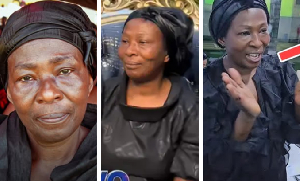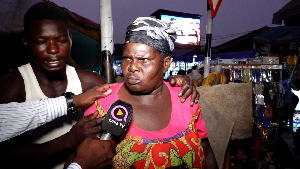News releases and press releases are a regular, important feature of the media space everywhere, including Ghana, but in this country are they all serving their purpose? I pose this question because of some problematic releases being issued here.
To explain the above journalistic terms, the following are definitions by two international media organisations:
“There’s one essential difference between a news release and a press release: time. A news release covers something that is currently happening or has already happened, a press release covers something that has yet to happen” (eReleases Press Release Service).
“Some simply believe that ‘news release’ is an updated and more relevant term compared to ‘press release’. The term ‘media release’ is also used. Ultimately, the format and intent of a press release, news release, or media release are very similar. (businesswire).
Although people use the terms, news release and press release, interchangeably, here in Ghana, the preference seems to be for ‘press release’. However, all three serve the same purpose: providing information to the public. Moreover, it seems to me that whether one is issuing a press release a news release, or a media release, what is essential is the reliability and timeliness of that information.
Mainly, a release is meant to announce through the media: a development, or clarify a situation, or correct misinformation, or provide the public with details about an issue. Thus, basically, releases are, or should be, “a trusted source of information”.
I don’t claim any expert knowledge about this subject, but relying on experience, I believe that some of the essentials of a media release are: a name and a signature – to authenticate the information in the release. Also, a direct contact number is a must.
The signature could be the intricate type – which is how some people like to format theirs. But even if there is no signature, there has to be a name, preferably with the designation of the signer stated.
Above all, the information has to be satisfactory, and authoritative. Unfortunately, instead of helping to inform or clarify, some releases in Ghana tend to generate more questions than answers, leaving the public either confused or frustrated – or both.
In my opinion, a recent example of such disappointing ones is the press release issued by the Ghana Police Service on February 19, 2024. It falls in the category of baffling, unhelpful releases because it left out the actual comment(s) which had apparently prompted that release.
The following is a copy of the Police release:
“POLICE STATEMENT ON COMMENTS BY DCOP MR GABRIEL PRINCE WAABU ON ELECTION SECURITY:
“The attention of the Ghana Police Service has been drawn to an unfortunate statement made by DCOP Mr. Gabriel Prince Waabu during a panel discussion on JoyNews, on Monday 19th February 2024.
The statements made by DCOP Mr. Gabriel Prince Waabu concerning election security are unfounded and do not represent the position of the Ghana Police Service. We would therefore like to disassociate the Ghana Police Service completely from the statements and apologize to the Ghana Armed Forces. The conduct of the officer is being subjected to internal disciplinary processes of the Ghana Police Service.
We want to state that under the National Elections Security Taskforce Architecture, The Ghana Police Service works with all other security services including the Ghana Armed Forces to ensure peace, security, law, and order, before, during, and after elections. The approach to the 2024 General elections will be no different.
The Ghana Police Service wishes to appeal to the general public to continue to support us and other sister security agencies as we work together to deepen our democratic values during the 2024 elections and beyond.”
I read the Police release a number of times, wondering if I had misread or misunderstood the words. I looked in vain for the “unfortunate statement” that DCOP Waabu allegedly made, his actual words or a summary, which had got the Police Service to react so swiftly and decisively. Notably, there is an apology to the Ghana Armed Forces. But no such details to satisfy anybody’s curiosity.
If the Police didn’t want to explain what was wrong about the DCOP’s comments, how would others avoid making similar comments? Was the release for the benefit of only those who had happened to be listening to that programme that day and time? Why the apparent assumption that everybody reading their release, or hearing about it, would know what the DCOP had said?
Probably the Administration thought it best not to spread the “unfortunate statement” further by not repeating it, but to me, that is a risky strategy. It leaves room for the public to ‘fill in the blanks’. Secondly, filling in the blanks could lead to wrongful information being substituted; perhaps even more damaging or controversial information than the original “unfortunate statement”.
In any case, why should a trustworthy, official source hide critical information, thus prompting guessing games?
Nevertheless, one commendable aspect of the Police release is that it bears a signature and a clear identity of the signer: “Grace Ansah-Akrofi, Assistant Commissioner of Police, Director, Public Affairs”.
What is missing, though, is a direct contact number for ACP Ansah-Akrofi, or her office. True, it’s on letterhead, with all the police new media contact details: email, Facebook, Twitter, etc. But how useful will contacts be to a news desk needing to clarify something in the release, but rushing to meet a production deadline? Will the news desk have time to go through all those contacts, trying to find somebody to answer some questions?
Another issue is that there are far too many instances of what I term ‘half-orphan’ communication or ‘half-orphan’ media releases, releases which may be on a letterhead (thus having one ‘parent’) but with no name of a contact person. In my view, a release with no name, only a departmental identity is an indication of somebody not wanting to be associated with the release, or its subject. No accountability! My interpretation would be that nobody in that organisation wants to be quoted on, or identified with, that release. Of course that might be a wrong conclusion, but that is the impression created by a release with only one ‘parent’ because it bears no name. Why would an institution expect the public to trust such a publication?
A striking instance of a one-parent release was the one issued earlier this month by the Ministry of Finance about the suspension of the controversial proposed 15 % VAT on “electricity consumption by residential customers”. It bore no name or signature, just “ISSUED BY THE PUBLIC RELATIONS UNIT, MINISTRY OF FINANCE”. Such an important announcement, about so critical a matter, surely needed a name and a signature! No wonder initially some of the labour organisations refused to accept it as an official statement from the Ministry! Another regrettable example of a ‘half-orphan release’, was the one by the National Petroleum Authority (NPA) on February 22, 2024, with the heading “Quality of Petrol Consignment from Sentuo Oil Refinery Limited”. Although it stated “Signed”, there was neither a signature nor a name! It said “Corporate Affairs Directorate”, not even ‘Corporate Affairs Director’!
One can imagine the numerous calls a media house would have to make to unearth the identity of the right person to give clarifications on that sensitive matter! And yet, the NPA is an organisation seemingly so meticulous that their letterhead even gives their location’s ‘Latitude’ and ‘Longitude’, in addition to their website and digital address! (latitude and longitude, in cartography, a coordinate system used to determine and describe the position of any place on Earth’s … Latitude and longitude together can describe the exact location of any place on Earth (Encyclopedia Britannica).
The irony! Why would the NPA whose letterhead helpfully even gives the exact location of their office, issue a press release with no contact name? In a country constantly swirling with rumours, misunderstandings and suspicion, establishments issuing press releases, news releases, or media releases, owe it a duty to make them as informative and authoritative as possible, authenticated by a name and reliable contact details.
ajoayeboahafari@yahoo.com
Opinions of Tuesday, 27 February 2024
Columnist: Ajoa Yeboah-Afari















